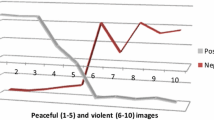Abstract
Research has shown that depressives are rejected and devalued by others. In an attempt to specify possible factors, the present study examined two features of depressive behavior—affective displays and verbal disclosures—that may independently or jointly contribute to the outcomes observed. Subjects watched a videotape of a dissimulator who appeared sad, flat, or happy in an interview (Affect factor), while they listened to an audio track containing depressive or nondepressive disclosures (Disclosure factor); control subjects heard no disclosures. As predicted, depressive disclosures led to rejection, devaluation, and discounting of the target. Alone, both sad and flat affect also produced derogation but, when paired with a disclosure, tended to be overshadowed by the kind of disclosure received. The results point to the powerful effect that depressive verbalizations can have on interpersonal reactions. Possible reasons for this are explored, along with other issues raised by the results.
Similar content being viewed by others
References
Beck, A. T. (1967).Depression: Clinical, experimental, and theoretical aspects. New York: Harper & Row.
Blumberg, S. R., & Hokanson, J. E. (1983). The effects of another person's response style on interpersonal behavior in depression.Journal of Abnormal Psychology, 92 196–209.
Boswell, P. C., & Murray, E. J. (1981). Depression, schizophrenia, and social attraction.Journal of Consulting and Clinical Psychology, 49 641–647.
Coates, D., & Wortman, C. B. (1980). Depression maintenance and interpersonal control. In A. Baum & J. E. Singer (Eds.),Advances in environmental psychology (Vol. 2, pp. 149–182). Hillsdale, New Jersey: Erlbaum.
Coyne, J. C. (1976a). Depression and the response of others.Journal of Abnormal Psychology, 85 186–193.
Coyne, J. C. (1976b). Toward an interactional description of depression.Psychiatry, 39 28–40.
Depue, R. A., & Monroe, S. M. (1978). The unipolar-bipolar distinction in the depressive disorders.Psychological Bulletin, 85 1001–1029.
Doerfler, L. A., & Chaplin, W. F. (1985). Type III error in research on interpersonal models of depression.Journal of Abnormal Psychology, 94 227–230.
Ekman, P., & Friesen, W. V. (1975).Unmasking the face. Englewood Cliffs, New Jersey: Prentice-Hall.
Ferster, C. B. (1973). A functional analysis of depression.American Psychologist, 28 857–870.
Forrest, M. S., & Hokanson, J. E. (1975). Depression and autonomic arousal reduction accompanying self-punitive behavior.Journal of Abnormal Psychology, 84 346–357.
Fowles, D. C., & Gersh, F. (1979). Neurotic depression: The endogenous-neurotic distinction. In R. A. Depue (Ed).,The psychobiology of depressive disorders: Implications for the effects of stress (pp. 55–80). New York: Academic Pres.
Gotlib, I. H., & Beatty, M. E. (1985). Negative responses to depression: The role of attributional style.Cognitive Therapy and Research, 9 91–103.
Gotlib, I. H., & Robinson, L. A. (1982). Responses to depressed individuals: Discrepancies between self-report and observer-rated behavior.Journal of Abnormal Psychology, 91 231–240.
Gurtman, M. B. (1986). Depression and the response of others: Reevaluating the reevaluation.Journal of Abnormal Psychology, 95 99–101.
Hammen, C. L., & Peters, S. D. (1977). Differential responses to male and female depressive reactions.Journal of Consulting and Clinical Psychology, 45 994–1001.
Hammen, C. L., & Peters, S. D. (1978). Interpersonal consequences of depression: Responses to men and women enacting a depressed role.Journal of Abnormal Psychology, 87 322–332.
Hokanson, J. E., Sacco, W. P., Blumberg, S. R., & Landrum, G. C. (1980). Interpersonal behavior of depressive individuals in a mixed-motive game.Journal of Abnormal Psychology, 89 320–332.
Howes, M. J., & Hokanson, J. E. (1979). Conversational and social responses to depressive interpersonal behavior.Journal of Abnormal Psychology, 88 625–634.
Jacobson, N. S., & Anderson, E. A. (1982). Interpersonal skill and depression in college students: An analysis of the timing of self-disclosures.Behavior Therapy, 13 271–282.
Jones, E. E., & Nisbett, R. E. (1971).The actor and the observer: Divergent perceptions of the causes of behavior. Morristown, New Jersey: General Learning Press.
King, D. A., & Heller, K. (1984). Depression and the response of others: A re-evaluation.Journal of Abnormal Psychology, 93 477–480.
Lewinsohn, P. M. (1975). The behavioral study and treatment of depression. In M. Hersen, R. M. Eisler, & P. M. Miller (Eds.),Progress in behavior modification (Vol. 1, pp. 19–64). New York: Academic Press.
Strack, S., & Coyne, J. C. (1983). Social confirmation of dysphoria: Shared and private reactions to depression.Journal of Personality and Social Psychology, 44 798–806.
Winer, D. L., Bonner, T. O., Blaney, P. H., & Murray, E. J. (1981). Depression and social attraction.Motivation and Emotion, 5 153–166.
Zajonc, R. B. (1980). Feeling and thinking: Preferences need no inferences.American Psychologist, 35 151–175.
Zuckerman, M., DePaulo, B. M., & Rosenthal, R. (1981). Verbal and nonverbal communication of deception. In L. Berkowitz (Ed.),Advances in experimental social psychology (Vol. 14, pp. 1–59). New York: Academic Press.
Author information
Authors and Affiliations
Rights and permissions
About this article
Cite this article
Gurtman, M.B. Depressive affect and disclosures as factors in interpersonal rejection. Cogn Ther Res 11, 87–99 (1987). https://doi.org/10.1007/BF01183134
Issue Date:
DOI: https://doi.org/10.1007/BF01183134




